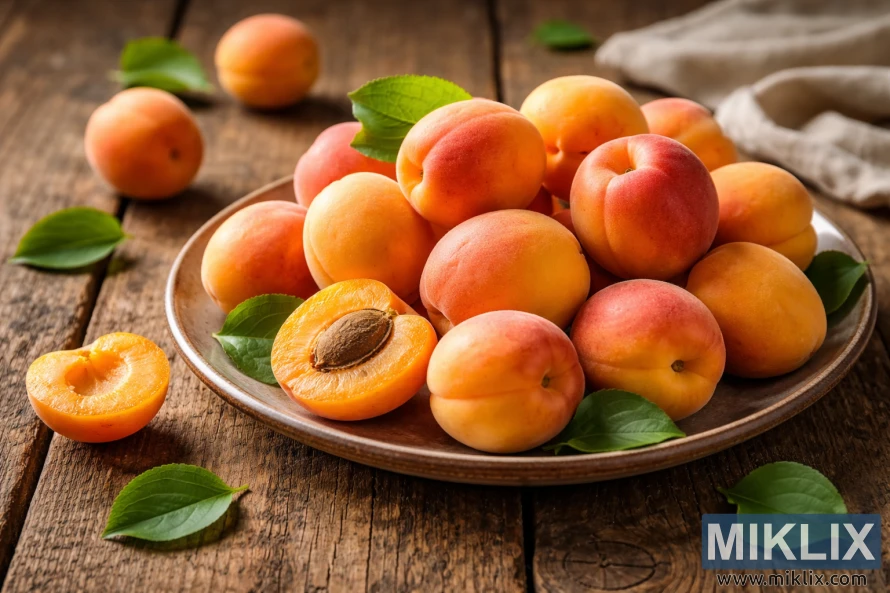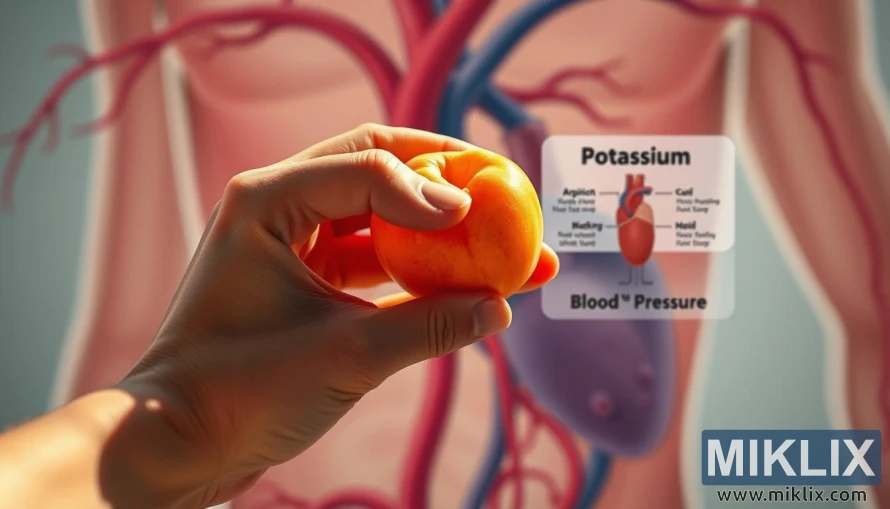Small Fruit, Big Impact: The Power of Apricots for Your Health
Published: May 22, 2025 at 8:43:46 AM UTC
Last updated: December 23, 2025 at 10:53:13 AM UTC
Apricots are more than just a tasty fruit. They are a nutritional powerhouse with many health benefits. These vibrant fruits are full of vitamins, minerals, and antioxidants. They can greatly improve your health. Adding apricots to your diet can bring many advantages. They help with eye health and digestion. This article will dive into the health benefits of apricots and how they can make your lifestyle healthier.

Key Takeaways
- Apricots are rich in antioxidants, which help combat oxidative stress.
- They provide dietary fiber that supports digestive health.
- Low in calories, apricots make a healthy snack option.
- The nutritional value of apricots positively impacts skin health.
- They are beneficial for maintaining eye health.
- Apricots are a good source of potassium, which helps regulate blood pressure.
Introduction to Apricots
Apricots, known scientifically as Prunus armeniaca, are a type of stone fruit that grows best in the summer. Their bright orange-yellow skin makes them a feast for the eyes. They also pack a punch of flavor and nutrients.
Apricots are similar to peaches and plums in both texture and taste. They are often eaten fresh. This makes them a great choice for a sweet and tangy snack on warm days.
Apricots are low in calories, which makes them a guilt-free summer treat. Adding them to your diet can bring a burst of freshness. They offer both health benefits and culinary uses.
Nutritious Profile of Apricots
Apricots are a nutrient-dense fruit with a remarkable nutritional profile. Just two fresh apricots, weighing about 70 grams, have only 34 calories. They are a satisfying snack choice.
These sweet fruits give you 8 grams of carbohydrates, 1 gram of protein, and 1.5 grams of dietary fiber. This contributes to their overall health benefits.
Apricots are rich in essential vitamins, like vitamins A and C. Each provides about 8% of the Daily Value. They are an excellent source of these vital nutrients, which boost immune function and skin health.
Apricots also contain minerals like potassium and vitamins like E. These add to their nutritional profile, making them even more beneficial.
Apricots have powerful antioxidants, including beta-carotene, lutein, and zeaxanthin. These fight free radicals in the body, supporting overall health. Enjoying apricots fresh or dried adds nutritional benefits to any diet.
Apricots are Low in Calories
Apricots are a great choice for those who want to stay healthy. They have only 34 calories per serving. This makes them a guilt-free snack for anyone watching their calories.
Apricots taste sweet and can help you feel full. They have fiber that helps you feel satisfied. This is good for managing your weight.
Eating apricots can boost your nutrient intake without adding too many calories. They are perfect for those who want to manage their weight healthily.
High in Antioxidants
Apricots are a fruit packed with antioxidants, which are key for good health. These compounds fight oxidative stress. This stress can cause diseases like diabetes and heart disease. Apricots are full of beta-carotene, making them more than just a healthy snack.
Apricots also have vitamins A, C, and E. These vitamins work with flavonoids like chlorogenic acids and quercetin. Together, they protect against harmful free radicals. Eating apricots helps keep your skin and eyes healthy and fights chronic diseases.
Adding apricots to your meals is a tasty way to get more antioxidants. Their sweet taste and many uses in cooking make healthy eating fun. Apricots are a great fruit to include in your diet for better health.

Promoting Eye Health with Apricots
Apricots are a tasty snack that's good for your eyes. They are packed with vitamins A and E. These vitamins help your eyes work well and protect them from diseases.
Apricots have important nutrients for your eyes:
- Vitamin A: It's key for clear vision and stops night blindness.
- Vitamin E: It's an antioxidant that protects your eyes from damage.
- Carotenoids like lutein and zeaxanthin: They help your eyes by blocking harmful light and preventing age-related diseases.
Eating apricots often can make your vision better. They help keep your eyes safe from UV rays. Adding them to your meals is a tasty way to care for your eyes.
Boosting Skin Health through Nutrition
Apricots are great for your skin because they're full of antioxidants and vitamins. They have vitamins C and E, which fight off damage from UV rays and pollution. Eating apricots regularly helps keep your skin safe from harmful free radicals.
Vitamin C is key for making collagen, a protein that keeps your skin firm and elastic. More collagen means stronger, more youthful-looking skin. The antioxidants in apricots also boost your skin's health, giving it a natural glow.
Eating apricots can make your meals better and improve your skin. You can enjoy them fresh, dried, or in smoothies. They're a tasty way to naturally boost your skin's health.
Supporting Digestive Health
Apricots are great for your digestive health because they're full of dietary fiber. A cup of apricots has about 3.1 grams of fiber. This helps keep your bowel movements regular and prevents constipation.
Fiber in apricots is good for your gut. Soluble fiber makes a gel in your gut, helping control blood sugar. Insoluble fiber makes your stool bulkier, helping food move through your system faster.
Apricots also feed the good bacteria in your gut. A healthy gut microbiome is key to good digestion. It can also lower the risk of obesity and heart disease. Eating apricots is a smart move for better digestive health.
Potassium Content and Blood Pressure Regulation
Apricots are a great source of potassium, a key mineral for heart health. Eating just two apricots gives you about 181 mg of potassium. This mineral is important for keeping blood pressure in check.
Potassium helps manage body fluids, which is good for blood flow. It also helps prevent bloating and lowers stroke risk by controlling blood pressure. Eating foods high in potassium, like apricots, is good for your heart.

Staying Hydrated with Apricots
Apricots are a great choice for staying hydrated. They are about 86% water. This makes them not only refreshing but also helps with hydration.
They are perfect for keeping your body cool, which is great in hot weather or after working out.
Adding apricots to your snacks helps you drink more water. Their sweetness makes them a tasty choice. Try them in smoothies, salads, or as a snack to boost your hydration easily.
Potential Liver Health Benefits
Research on apricots and liver health is just starting. Some studies suggest apricots' antioxidants might protect the liver. They fight oxidative stress, which can harm liver cells.
Animal studies show apricots might lower liver inflammation markers, even with alcohol. This hints that apricots could help with alcohol's harmful effects on the liver.
But, we need more human studies to be sure. Eating apricots can add to a healthy diet. It might help both liver health and overall well-being.
Versatile Ways to Enjoy Apricots
Apricots are incredibly versatile, making them a great addition to many meals and snacks. Enjoying them fresh is a sweet and juicy treat. You can also add them to salads for extra flavor or mix them into yogurt for a nutritional boost.
Dried apricots are perfect for a quick snack. They're full of nutrients and fiber, making them a great energy source. You can add them to trail mixes, bake them into cookies, or even make delicious jams.
Apricot recipes are endless, perfect for those who love to cook. Try making apricot-glazed chicken for a savory dish or use them in desserts like tarts and crumbles.
There are so many ways to use fresh and dried apricots in your cooking. Exploring their versatility can lead to amazing culinary discoveries.
Incorporating Apricots into Your Diet
Adding apricots to your meals can be fun and healthy. Try pairing them with yogurt or cottage cheese for a tasty and nutritious mix. This combo helps keep blood sugar levels stable, which is great for people with diabetes.
Fresh apricots make a great snack on their own. Their sweetness is perfect in smoothies, adding flavor and nutrients. They also add a nice touch to oatmeal, making breakfast more interesting. Plus, you can add diced apricots to salads and grain bowls for a healthy twist.
Try different ways to prepare apricots to keep your meals exciting. Enjoy them fresh or use them in various recipes. Apricots can be a big part of a healthy diet.
Conclusion
Apricots are not just tasty; they're also packed with nutrients. They help keep your eyes and skin healthy. They also keep you hydrated and support your digestive system.
Apricots have a great mix of vitamins and minerals. They're perfect for anyone wanting to eat more fruits. You can enjoy them fresh or dried, adding flavor to your meals.
Adding apricots to your diet can make your meals more enjoyable. It also brings many health benefits. So, make apricots a regular part of your fruit intake for a healthy and tasty choice.

Further Reading
If you enjoyed this post, you may also like these suggestions:
- Ginger and Your Health: How This Root Can Boost Immunity and Wellness
- Harnessing Ginseng: Nature’s Answer to Stress, Stamina, and Cognitive Clarity
- Why ZMA Might Be the Supplement You’re Missing
